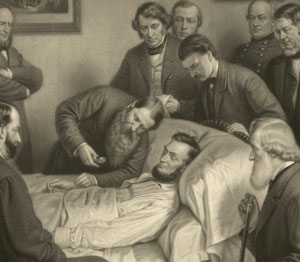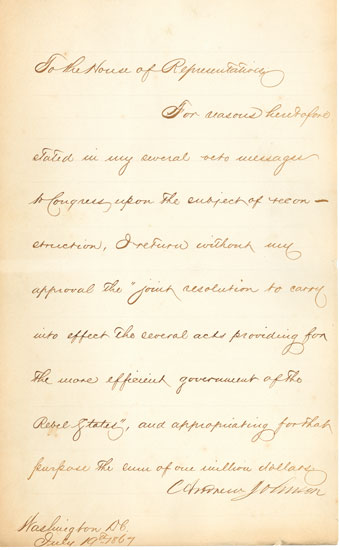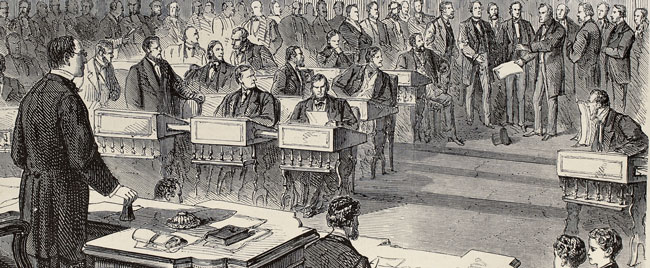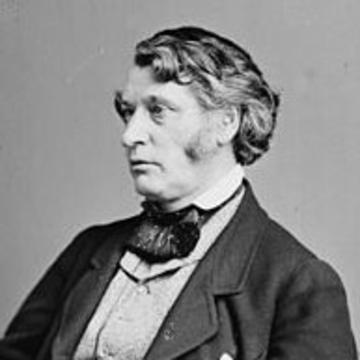Andrew Johnson’s impeachment and the legacy of the Civil War
He started as a hero and ended as “the impersonation of the tyrannical slave power.”

On April 15, six weeks after Andrew Johnson was sworn in as vice president of the United States, Abraham Lincoln was assassinated. Had the assassin's plot gone as planned, Johnson, Ulysses S. Grant, and Secretary of State William Seward would have also been killed. As it turned out, co-conspirator George Atzerodt, who had stalked the vice president, lost his nerve at the last minute.
A few hours after Lincoln's death, Chief Justice Salmon P. Chase swore Johnson in as President of the United States. Republicans were relieved that Johnson had not been killed and could provide continuity; they thought that he would be putty in their hands and would follow the dictates of Republican congressional leaders. They were mistaken. And the resulting conflict between president and Congress led to the first presidential impeachment in American history.
In Johnson's mind, the issue of what to do with the defeated Southern states was simple: impose conditions upon their return to full standing, such as the irrevocable abolition of slavery but do not impose black suffrage as a condition of readmission.
Many Radical Republicans had assumed that Johnson shared their broad and expansive concept of federal power and their commitment to political equality for blacks. But with the exception of the right to secede, Johnson had always believed in states' rights. He followed Lincoln's earlier reasoning that while individual "traitors" should be punished, the states had never legally left the Union nor surrendered their rights to govern their own affairs. In Johnson's mind, the issue of what to do with the defeated Southern states was simple: impose conditions upon their return to full standing, such as the irrevocable abolition of slavery but do not impose black suffrage as a condition of readmission.

Not surprisingly, when Congress reconvened in December, the Republican majority established a Joint Committee of Reconstruction to examine Johnson's policies and voted not to admit the newly elected Southern representatives or to recognize the newly reestablished state governments as valid. Congress and the president clashed continually over the next two years.
On March 2, 1867, following major Republican victories in the off-year elections of 1866, Congress moved to limit Johnson's powers in several ways. The Command of the Army Act instructed the President to issue orders only through the General of the Army, then Ulysses S. Grant, who could not be removed nor sent outside of Washington without Senate permission. On the same day, Congress passed the Tenure of Office Act which prohibited the president from removing certain federal officials without senatorial approval.
By late 1867, most Southern states held constitutional conventions, and all of them were dominated by a Republican coalition consisting of white Southerners supporting Reconstruction, Northern transplants to the South, and the newly enfranchised freedmen. Between June 22 and 25, 1868, Congress readmitted seven Southern states—Arkansas, Alabama, Florida, Georgia, Louisiana, North Carolina, and South Carolina—to full status in the Union.
Johnson’s vetoes of the Reconstruction Acts tried to preempt Radical Reconstruction by associating it with vengeance, subjugation, and disunion. He called the congressional program an exercise in “absolute despotism” that would “Africanize” the South, and he repeatedly claimed that the reunion of the North and South would have been “easy and certain” if only Congress had not defied him. Although he believed he represented the will of the masses of whites in the North as well as South, Johnson was out of step with public opinion, and Congress easily overrode his vetoes.

Thoroughly blocked at every turn, Johnson felt he had no choice but to challenge what he considered to be the usurpation of presidential authority in the Tenure of Office Act. Understanding that he risked impeachment, Johnson challenged the act by dismissing Secretary of War Edwin Stanton on August 12, 1867, while Congress was out of session. He then named General Grant as interim secretary of war. When Congress reconvened in December, Johnson submitted his reasons to the Senate, but the Senate refused to concur with the dismissal under the provisions of the law. Grant broke with the President. The crisis flared up again, however, on February 21, 1868, when Johnson dismissed Stanton once more. On February 24, 1868, the House voted to impeach Johnson by a vote of 126 to 47 without holding hearings first or having specific charges against him. The House subsequently drew up eleven charges against the President, principally associated with his alleged violations of the Tenure of Office Act and the Command of the Army Act but also including charges that his actions had brought disgrace and ridicule to the presidency.
The managers of the House of Representatives Impeachment Committee presented the articles to the Senate for trial on March 4, and the trial began with opening statements on March 30, presided over by Chief Justice Chase. Johnson's legal counsel argued that Johnson had fired Stanton to test the constitutionality of the Tenure of Office Act and that his action constituted neither a high crime nor a misdemeanor by any sensible definition of the terms. Voting on May 16, the Senate failed to convict Johnson by one vote of the two-thirds necessary—35 votes to 19 votes. Two subsequent ballots on May 26 produced the same results, and the Senate adjourned as a court of impeachment.

The impeachment of Andrew Johnson involved complicated issues of law, politics, and personalities. At its heart lay the nearly irreparable relations between President Johnson and Congress over which agency of government should oversee Reconstruction. This question of competing authority masked, however, a more fundamental issue: Congress had instructed the U.S. Army to implement a policy that its commander in chief vehemently opposed. In direct violation of congressional intent and the Command of Army Act, Johnson had used the summer of 1867, when Congress was not in session, to remove several military commanders in favor of officers more supportive of white rule in the South. Later, he tried to create an "Army of the Atlantic," headquartered in the nation's capital, as a means of intimidating his opponents in Congress. Seeing that Johnson was using the Army to play politics and thus endangering the lives of soldiers in the field, Grant turned against the President.
The principal issue was Johnson's loss of support within the majority congressional party. Almost all Republicans agreed that Johnson was totally unfit for office. Republicans felt that Johnson had disgraced the government and the party and abdicated the moral high ground that the Union and Republicans had won in the war.
But these were not clearly impeachable offenses, and this uncertainty worked in the President’s favor. Also, because no vice president had been elected after Johnson's ascent to the presidency, his successor would have been Benjamin Wade, president pro tem of the Senate, an extreme radical on Reconstruction and a soft-money, pro-labor politician feared by many Northern businessmen. With Senator Wade in the wings, many Johnson opponents were hesitant about voting to convict, especially those who thought that if Wade assumed the presidency, he might try for the nomination in 1868, thus blocking General Grant. Also, Chief Justice Chase refused to allow deviation from the charges to discuss or include broader issues of policy.
Many Senate Republicans had decided to make it a close vote but not a conviction.
In the end, the seven Republicans who voted to acquit—most of them supporters of Grant—were silently supported by their moderate party colleagues. Many Senate Republicans had decided to make it a close vote but not a conviction, especially once it became clear that if Johnson was acquitted, he was prepared to cease his obstructionist ways for the rest of his term and stop his interference with Reconstruction and with the military commanders and the War Department.
The final vote maintained the principle that Congress should not remove the President from office simply because its members disagreed with him over policy, style, and administration of office. But it did not mean that the President retained governing power. For the rest of his term, Johnson was a cipher without influence on public policy. Moreover, between his presidency and the turn of the century, a "weak presidency" system of governance was instituted, one which Woodrow Wilson referred to in the 1870s as "Congressional Government" because after the Johnson collapse, the country was really run by congressional committee leaders and cabinet secretaries.


